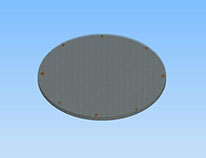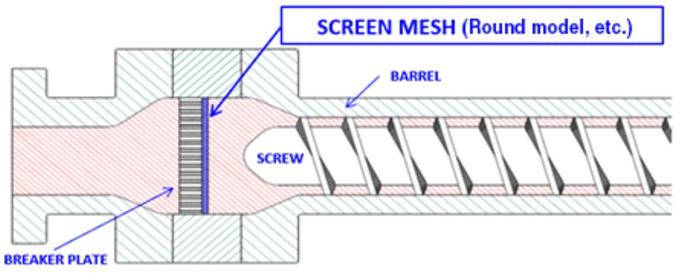
What is resin extrusion molding?
Extrusion molding is a molding method in which various materials such as metals and resins are extruded into desired shapes for processing. Resin extrusion is an extrusion method that involves melting and processing thermoplastics that deform when heat is applied.
Materials used in resin extrusion molding
Synthetic resins, such as those shown below, and additives can be used in resin extrusion molding to manufacture resin products with various functions and shapes as well as transparent film materials for touch panels.
- Polyester
- PA (nylon)
- PMMA (acrylic)
- PC (polycarbonate)
- PP (polypropylene)
Products that can be processed by resin extrusion molding
During resin extrusion molding, pellet resin is supplied from the hopper of the extruder, and the resin is then melted and mixed using an electric heater or screw. The resin is then extruded through an extrusion port called a die.
The shape of the extrusion port determines the shape of the molded product, and the following products can be processed through continuous processing methods such as drawing and lamination using ancillary equipment.
- Sheet film
- Tubes
- Round bars
- Laminated products
- Pellets
Types of extruders
There are various types of extruders, and the best extruder will vary depending on the properties of the resin used and the target product.
(1) Single-screw extruders
Single-screw extruders are the most common type of extruders and can mix all resin materials using a single screw. These include vent-type single-screw extruders that mix the material while discharging volatile components, and tandem-type extruders that use multiple installed screws with varying diameters for extrusion, suitable for PMMA and other materials.
(2) Twin-screw extruders
Twin-screw extruders have two screws installed in the cylinder. These extruders are available in two types: a uniform direction type with the screws rotating in the same direction, and a different direction type with different rotation directions. The screw shapes are also available as parallel types and tapered (conical) types.
Compared with single-screw extruders, twin-screw can mix at low rotational speeds and low temperatures, making them useful for extrusion molding using resins such as ABS and polystyrene.
(3) Special extruders
Special extruders are extruders with special shapes and multi-screw threads. These include ko-kneader extruders, which produce granular pellets for extrusion, and planetary screw extruders, which are used to mix vinyl chloride and produce compound pellets.
Screen meshes for extruders
Extruders use heaters and screws to melt and mix pellet-shaped resin, so the condition of the molten resin before extrusion affects the quality of the final product. Screen mesh is indispensable for improving the quality of resin extrusion molding.
Role of screen mesh
In resin extrusion molding, molten resin carbides, unmelted resin, gelatinous foreign matter, and metal contaminate the final molded product, reducing both quality and yield due to breakage during film molding. To prevent this, a screen mesh is used to filter various foreign matters in the extruder.
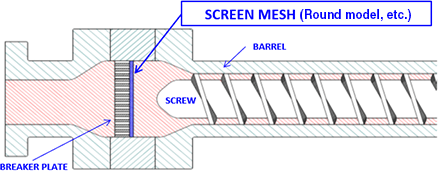
Types of screen mesh
A screen mesh is installed in the extruder together with the breaker plate, and it is effective not only for filtration but also for adjusting the backpressure in the cylinder to enhance the mixing effect. The screen mesh material, wire diameter, opening dimension, and shape must be appropriate for both the type of extruder and the synthetic resin being used.
(1) Plain weave screen mesh
This is the most standard type of wire cloth and is shaped with individual alternately woven wires.
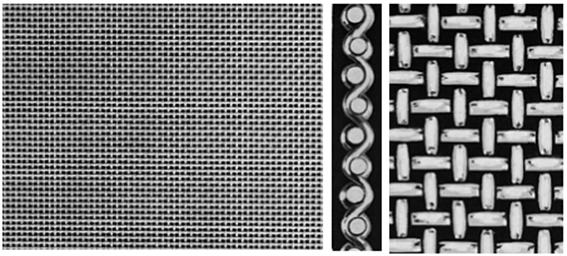
(2) Twilled weave screen mesh
This mesh features relatively wide openings and is produced by weaving two wires with each other.
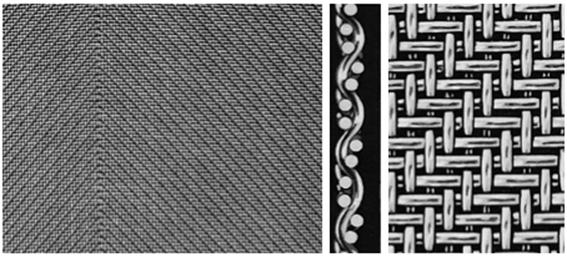
(3) Plain dutch weave screen mesh
In this mesh, the wire is woven closely like a tatami mat, giving it both high strength and a suitable shape for strainers and the like.
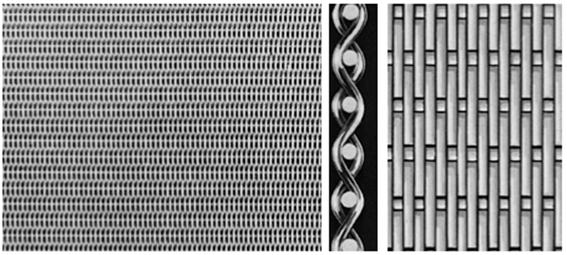
In addition to these mesh types, Taiyo Wire Cloth also offers cedar twilled weave and twilled dutch weave meshes.
Screen mesh material
Taiyo Wire Cloth can create meshes of the following materials according to customer needs and specifications.
- Stainless steel: SUS304, SUS316, SUS316L, 904L, SUS321, SUS347, etc.
- Nickel and nickel alloys: Nickel 200, Inconel 601, Hastelloy C22, etc.
- Iron: Iron, galvanized iron, etc.
- Copper: Copper, brass, phosphor bronze, etc.
- Nonferrous metals: Aluminum, tungsten, titanium, molybdenum, etc.
Processing with other materials is also possible, so please contact us via the following link.
Product Inquiries and Quotations
Mesh shapes compatible with screen changers
A screen changer is used to efficiently replace a clogged screen mesh without stopping the extruder. There are various types of screen changers--such as valve switching changers, slide changers, and continuous changers--and mesh shapes must be selected according to the screen pack shape.
Taiyo Wire Cloth can produce meshes in various shapes to match various screen changer specifications, including round, oval, doughnut, and framed meshes.

Mesh filters for extruders
Foreign matter and other particles that cannot be filtered by the screen mesh in the extruder can be removed by installing a mesh filter in front of the extrusion port. Selecting a shape suitable for the material is important because the filtering performance and filter pressure adjustment vary not only according to the opening dimensions but also by the shape of the disc filter and mesh strainer.
Sintered wire cloth
This product features various superimposed sintered wire cloth, such as plain weave and plain dutch weave, in an integrated construction that enhances filtration accuracy. When used as an extrusion screen, the wire is resistant to fraying and peeling because of its high stability under high pressure, allowing for repeated use. Combinations and lamination numbers can be customized to suit the customer's application.
Metal sintered non-woven fabric
Non-woven fabrics of metal fibers are sintered, sandwiched with wire cloth, and screen processed for use as filters. Metallic non-woven fabrics have a three-dimensional structure with high porosity and filter inside rather than on the surface. This gives them better performance than fabrics such as plain weave mesh when it comes to remove foreign matter such as gels, making them a common filtration tool of liquids and polymers.
For more information on screen meshes for extruders, contact Taiyo Wire Cloth.
Contamination from unmelted resin or foreign matter can significantly impact product quality in resin extruders. Screen meshes used for filtration and backpressure adjustment must not only be made of the appropriate material but also must feature highly precise wire diameters and opening dimensions.
Our extensive knowledge of wire mesh manufacturing allows Taiyo Wire Cloth to propose a variety of processing methods, including screen meshes manufactured and supplied in response to increasingly sophisticated and higher quality extrusion molding functions, as well as press drawing and welding (spot welding and seamless welding).
Product Inquiries and Quotations

